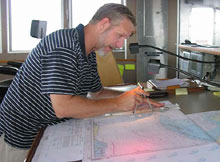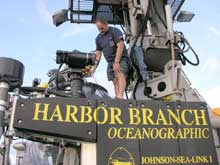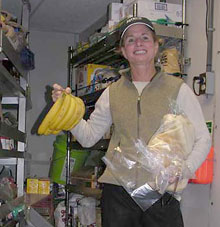
First Mate Mike Schoeller checks his charts to confirm the ship’s faster-than-expected transit time to its first dive location. Click image for larger view.
Ready, Set, Go!
August 20, 2005
Cindy Renkas
Web Coordinator
NOAA Office of Ocean Exploration
Latitude: 26° 19.85' N
Longitude: 84° 46.00' W
As the R/V Seward Johnson steams from its home port at the Harbor Branch Oceanographic Institution in Ft. Pierce, Florida towards its first dive site on the southwest Florida Shelf in the Gulf of Mexico, onboard preparations are underway to support its crew and the scientific mission.
Captain Aric Anderson and First Mate Mike Schoeller originally announced that transit time would be approximately 49 hours, but with a prevailing southeasterly wind and only about one knot of current as opposed to the expected 2.0-2.5 knot current, the new estimated arrival time is 8:00 Sunday morning, only 45 hours after departure. Sailing inside the Gulf Stream but outside the NOAA National Marine Sanctuary, our 2.5 million pound ship (more info. about the R/V Seward Johnson) is moving at about 10.8 knots, or about 12 mph. At this speed, we are using approximately 2,000 gallons of #2 diesel fuel per day – the same kind of fuel used in many pick-up trucks. The 35,000 gallons of fuel we have onboard will be more than enough for the 650 mile voyage.

Submersible pilot Hugo Marrero checks the positioning of the LOLAR on top of the JSL. Click image for larger view.
In another part of the ship, the submersible crew is at work preparing the Johnson-Sea-Link (JSL) for its starring role. Just charging batteries for its many parts is a big job: there are batteries for the two tracking beacons, the CTD (an instrument which measures conductivity, temperature, and depth), the oxygen and carbon dioxide meters, and, most impressive of all, the 3600 pound submersible battery and the emergency back-up battery. Other submersible preparations include installing mounting brackets for the high intensity lights which will be used in different positions for different dives, threading power and control cables in “penetrators” (openings) through the hull to operate and control the Deep Scope scientists’ instruments from inside the sub, and installing Dr. Edith Widder’s LOLAR (Low Light Auto Radiometer) on top of the JSL to measure downwelling light.
And supporting the work of all aboard, Cook Bobbie Bixler has brought on provisions in quantities to ensure a happily well-fed ship’s crew and science team of 33: about 160 pounds of beef and pork, 160 pounds of chicken, 160 pounds of seafood, 54 pounds of luncheon meats, 720 eggs, 50 pounds of butter, 80 pounds of bagels and English muffins, 7 cases of fruits, 7 cases of berries, 5 cases of salad greens, 125 pounds of potatoes, 100 pounds of fresh vegetables, and, the fuel for those working long hours….50 # of coffee.
Dr. Edith Widder and Ocean Engineer Lee Frey (see “Explorers”) are scheduled for the first submersible dive of this expedition tomorrow morning. All is at the ready!



























